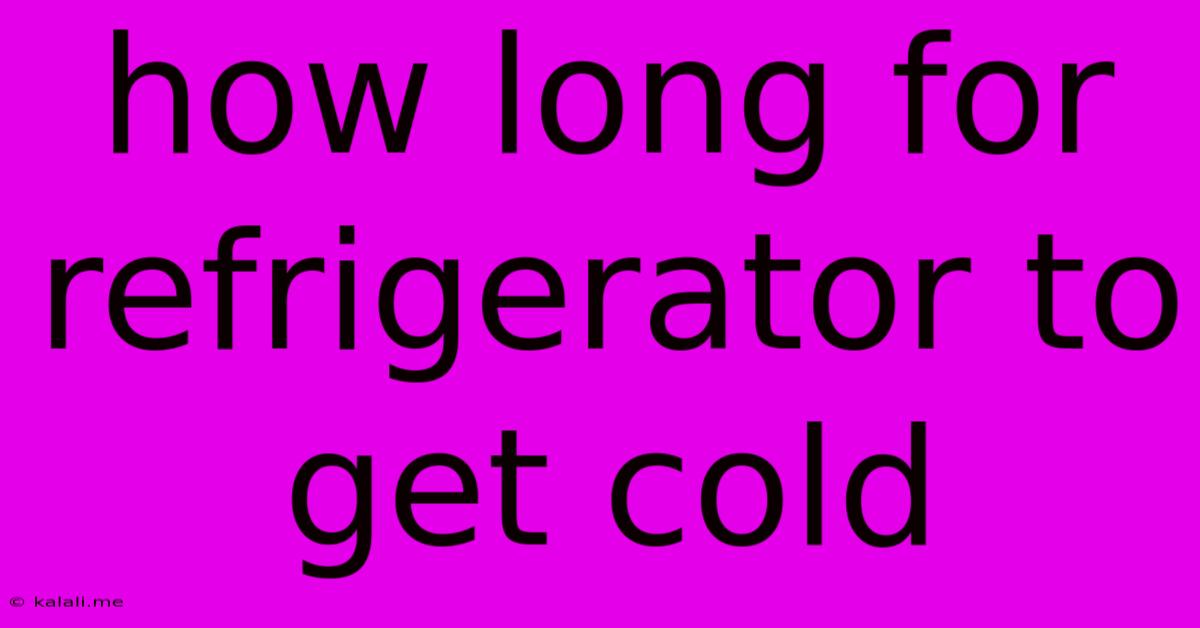How Long For Refrigerator To Get Cold
Kalali
May 20, 2025 · 3 min read

Table of Contents
How Long Does it Take a Refrigerator to Get Cold? A Comprehensive Guide
Getting a new refrigerator or experiencing a power outage can leave you wondering: how long does it take a refrigerator to reach the optimal temperature? The answer isn't a simple number, as several factors influence the cooling time. This guide delves into those factors and provides a realistic timeframe for your fridge to get cold.
Factors Affecting Refrigerator Cooling Time:
Several factors influence how quickly your refrigerator reaches its ideal temperature, including:
-
Initial Temperature: A completely empty refrigerator at room temperature will cool down faster than one already filled with food, especially warm leftovers. The warmer the starting temperature, the longer the cooling process.
-
Refrigerator Size and Model: Larger refrigerators naturally take longer to cool than smaller ones. The efficiency of the compressor and design of the cooling system also play a significant role. Some newer models boast faster cooling technologies, reducing overall time.
-
Ambient Temperature: The surrounding room temperature greatly impacts cooling time. A hot room will require the refrigerator to work harder and thus take longer to reach its set point.
-
Amount of Food: As mentioned earlier, a full refrigerator takes longer to chill. The more food you have, especially warm food, the longer it will take. Leaving space for proper airflow is crucial for efficient cooling.
-
Door Openings: Frequent door openings allow warm air to enter, increasing the cooling time and energy consumption. Minimizing door openings during the initial cooling period is highly recommended.
Typical Cooling Timeframes:
While there's no single definitive answer, here's a general guideline:
-
Empty Refrigerator: A completely empty refrigerator at room temperature might reach the desired temperature (around 37-38°F or 3-4°C) within 2-4 hours.
-
Partially Filled Refrigerator: A refrigerator with some food items might take 4-6 hours to reach the optimal temperature.
-
Fully Loaded Refrigerator: A fully loaded refrigerator can take 6-8 hours, or even longer depending on the factors mentioned above.
Tips for Faster Cooling:
-
Pre-chill items: If possible, chill food and drinks before placing them in the refrigerator. This reduces the cooling load on your appliance.
-
Proper ventilation: Ensure sufficient space around your refrigerator for proper air circulation.
-
Avoid overcrowding: Don't overcrowd your refrigerator. This prevents proper airflow, hindering efficient cooling.
-
Check door seals: Ensure your refrigerator's door seals are intact and tightly sealed to prevent warm air from entering.
What to Do After a Power Outage:
After a power outage, the cooling time will depend on how long the power was out and the ambient temperature. Check the temperature with a refrigerator thermometer. If your refrigerator is still relatively cool (below 40°F or 4°C), it might take just a few hours to get back to the desired temperature. However, if the temperature is significantly higher, discard any perishable items that might have spoiled.
Conclusion:
The time it takes for your refrigerator to get cold is dependent on multiple variables. While the timeframes above provide a general idea, it's crucial to consider these influencing factors for a more accurate estimate. By following the tips mentioned above, you can help expedite the cooling process and maintain the optimal temperature within your refrigerator, ensuring food safety and longevity. Remember to always monitor your refrigerator temperature using a thermometer for the most accurate reading.
Latest Posts
Latest Posts
-
How Long Keep New Cat Indoors
May 20, 2025
-
Gpg Failed To Sign The Data
May 20, 2025
-
Calories In A Cup Of Dry Rice
May 20, 2025
-
Does Car Oil Go Out Of Date
May 20, 2025
-
Can I Take An Empty Water Bottle On A Plane
May 20, 2025
Related Post
Thank you for visiting our website which covers about How Long For Refrigerator To Get Cold . We hope the information provided has been useful to you. Feel free to contact us if you have any questions or need further assistance. See you next time and don't miss to bookmark.